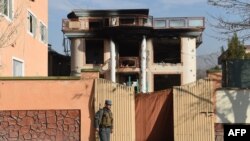A rise in Taliban attacks in Afghanistan's capital and elsewhere in the country is raising questions about whether local security forces can protect the country after NATO ends its 13-year combat mission on December 31.
Taliban attacks have seen a steady rise in Afghanistan this year but the Islamist insurgency has lately focused most of its violent campaign on Kabul. Within the past month, Afghan authorities say, around a dozen high-profile attacks have hit the capital.
Saturday evening, heavily armed Taliban suicide bombers in police uniform attacked a foreign guest house in a highly secured neighborhood near the national parliament. Among those killed were a South African aid worker, his son, a daughter and an Afghan employee of the U.S.-based relief organization Partnership in Academics and Development.
Afghan security personnel shot dead two of the invaders while a third man blew himself up during the hours-long gunfight.
Security agreements with US
Interior Ministry spokesman Sediq Seddiqi on Sunday suggested the rise in Taliban attacks is a reaction to the security agreement the new Afghan leadership has signed with the United States.
He said the attacks in Kabul “have a direct link to developments like the government’s decision to accept United States as a strategic partner of Afghanistan and as a partner that will assist and train Afghan security forces.”
Seddiqi went on to say the security deal sent a clear message to the enemies of the Afghan people that an important and biggest partner of the country will not abandon it.
The Taliban said it was responsible for Saturday’s attack, claiming the guest house was a Christian center engaged in converting Muslims.
The Interior Ministry spokesman blamed local and foreign militants, including some operating in neighboring Pakistan, for the rise in attacks in Kabul. He would not confirm whether the government has accepted the resignation of the city’s police chief for failing to prevent the violence.
Seddiqi says the government has decided to enhance police patrols in the capital and urged residents to assist authorities in identifying suspected terrorists sheltering in their neighborhoods, especially those who disguise themselves in uniforms of security forces.
A Briton working for the British Embassy in Kabul was among five people killed in a Taliban suicide bombing on Thursday. Later that day, Taliban gunmen raided a foreign guest house in the Wazir Akbar Khan district.
Helmand province operation
Meanwhile, Interior Ministry spokesman Seddiqi says a clearing operation is under way in southern Helmand province where fighting between security forces and Taliban insurgents has been raging since Thursday. He said at least nine Afghan soldiers and 30 Taliban fighters have died so far. The fighting erupted when a large group of militants attacked a military base known as Camp Bastion that British troops vacated last month as part of NATO’s drawdown plans.
The rise in insurgent violence is being blamed on the inability of new Afghan President Ashraf Ghani and his Chief Executive Abdullah Abdullah to finalize the Cabinet of the national unity government. The delay has also provoked severe criticism of the two leaders in the Afghan media for not setting aside personal differences and letting hopes for a stable Afghan future diminish.












